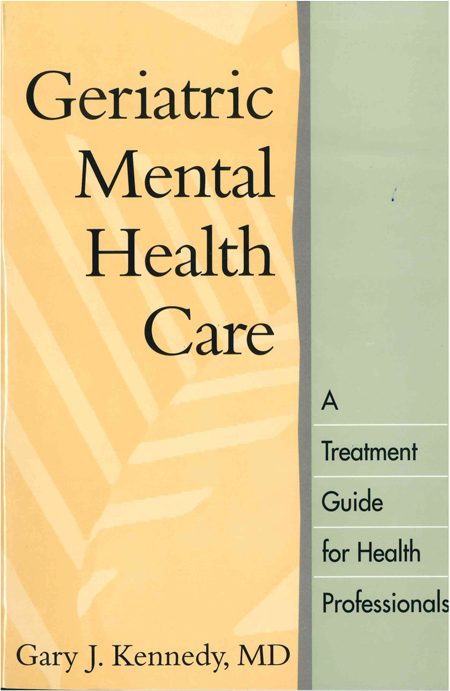

This essential guide is desgined for mental health practitioners for understanding the interplay of medical, psychological, and social factors in frequently encountered problems among older adults, including depression and anxiety, dementia, psychosis and mania, sleep disturbances, personality and somatoform disorders, substance abuse and suicidality. Throughout, the book focuses on ways to sustain seniors' independence and overall quality of life while enhancing their adaptive capacities.
Gary J. Kennedy, MD, is Professor of Psychiatry and Behavioral Science at Albert Einstein College of Medicine and Director of the Division of Geriatric Psychiatry and the Psychogeriatric Fellowship Training Program at Montefiore Medical Center in Vronx, New York. He is also Supervising Psychiatrist of the Geriatric Unit at Bronx Psychiatric Center. More than 30 psychiatrist have completed geriatric training under his diredtion. His research and teaching have focused on cardiac arrhythmias, the epidemiology of depression and dementia, and mental health care in nursing homes and in the commnunity.
1. List several myths about aging
2. Discuss the genetic, metabolic, autoimmune, endocrine and the biological clock
theories of aging.
3. Describe the older generation regarding health and life expectancy.
4. Discuss how religion plays a role in the life of the older adult.
5. State the four elements of the health beliefs model.
6. Compare pharmokinetics and pharmodynamics.
7. Compare epidemiological studies and clinical studies of depression in older residents.
8. Discuss suicide in the older adult.
9. Describe cognitive-behavioral therapy for the older depressed patient.
10. Compare antidepressant and antianxiety medications.
11. Define dementia.
12. Describe how Alzheimer’s disease is diagnosed.
13. List distinguishing features of Alzheimer’s disease.
14. Compare the cognitive assessment and functional impairment assessment.
15. Discuss the ABC’s of problematic behavior.
16. List several problem behaviors and their symptoms.
17. Compare late-onset and early-onset schizophrenia.
18. Describe tardive dyskinesia.
19. Discuss the research of Kupfer and Reynolds (1997) regarding sleep disturbances.
20. Discuss treatment for late-life sleep disturbances.
21. Describe the personality disorders.
22. State the treatment for personality disorders.
23. List the four characteristics of somatoform disorders needed for diagnosis and treatment.
24. Discuss several items known about therapy with older persons.
25. List types of psychotherapy appropriate for older adults according to Table 7.1.
26. Compare transference and countertransference.
27. Describe cognitive-behavioral therapy for specific disorders.
28. Discuss the 10 concepts by Lewis (1998) when assessing difficulties among couples and the six common traits they demonstrate.
29. Describe treatment modalities and the outcome.
30. Describe examples of therapeutic structures.
31. List the five points regarding caregiving according to Zarit and Zarit (1998).
32. Discuss common contributions to late-life sexual dysfunction.
33. List several treatments for late-life sexual dysfunction.
34. Discuss prevalence estimates of elder abuse.
35. State several interventions when elder abuse is suspected.
36. State signs of abuse and neglect.
37. Compare the prevalence of alcohol and nonalcohol substances in late life.
38. Compare the symptoms of abuse and dependence according to Table 11.2.
39. Describe the various alcohol abuse screening instruments.
40. Describe the six dimensions to the assessment of substance abuse according to the
American Society for Addiction Medicine.
41. Discuss treatment options for alcohol problems among the elderly.
42. Discuss suicide prevalence data internationally and according to gender and race.
43. Discuss methods of suicide.
44. Compare management for acute suicidal risk and chronic suicidal risk.
45. Describe several models and methods through which mental health services and training may be delivered.
46. Discuss the mental health components to the provision of palliative care.
47. Discuss mental health care in nursing homes.
48. Discuss autonomy and its limits, abandonment, and the sanctity of life.
49. Define competence, incompetence, and capacity.
50. List the three requirements needed to involuntarily admit a patient to a
psychiatric facility.
51. Discuss a health-care proxy and advanced health directives.
52. Discuss the importance of exercise and nutrition from Table 15.1 and 15.2.
53. Describe healthy exercises for seniors.
© 2007 - 2010 Homestead Schools, Inc. - Webmaster: ITSYS Solutions